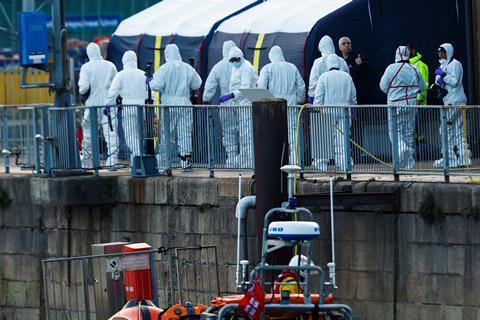The outpouring of national grief for the migrants who died will be more muted than for the tragic boys of the West Midlands, predicts George Pitcher. But Christians must not let distance or disinterest prevent us from being the good Samaritan to all this Advent, he says

Qatar’s hosting of the 2022 World Cup has offered less of a master class than a disaster class in international public relations.
From the casual oppression of its LGBT citizens to the deadly oppression of migrant workers building its stadiums; from allegations of bribery and corruption of football’s governing body, FIFA, to its now apparent efforts to warp European democracy in the EU parliament, Qatar has attracted attention to it’s rancid reputation in global affairs.
The worry, though, is less how it has got away with it for so long, but rather how the West has looked the other way. It’s a sort of inversion of the parable of the Good Samaritan (Luke 10:30-37), as if we have crossed the road not to assist the person lying bleeding and mugged in the road, but the thief who beat him up.
Diverted attention
Looking the other way is what we do when it suits our national interests. That’s how the idea, articulated at the start of this World Cup, developed that it was ‘time just to put our differences aside’ and ‘enjoy the football’.
It’s no less reckless for children to be on a frozen lake than in a people smuggler’s dinghy
This attitude would have gained limitless traction had England captain Harry Kane not sprayed his second penalty over France’s crossbar and, instead, led his team on to victory. If England were facing Argentina in this Sunday’s final, the national mood would have little time for quibbles over Qatari corruption and oppression.
Neutrality is not a thing
As it is, there’s a different version of the same thing. It’s Argentina versus France, so nothing to do with us. Let’s just enjoy the football, eh? Because we’re neutrals, right?
Wrong. We’re not called to be neutral. It’s not an option to overlook how people are brutalised for their sexuality, wherever they are; how migrants are treated as slave labour and how money talks louder than integrity to European politicians. It is - literally as disciples - our job to stand up for the poor, the marginalised and the oppressed, and to call out those who are making all that stuff happen.
But it’s all happening very far away. So perhaps it’s not our problem. The danger of this isolationist attitude is that we bring it home. It begins to infect the way we think on our own doorstep. Or, more accurately, on our own beaches.
I’m going to make a moral comparison here that some will find distasteful. Too bad – we’re sometimes also called to tell it how it is.
Lakes and migrants
Our country is united in sharing the grief of those who lost four young boys after they fell into a frozen lake near Solihull in the West Midlands last Sunday. Universally, our hearts go out to those families. We feel their unbearable pain and hopelessness and pray for and with them for deliverance.
I wonder if the same can be said for the four people we know about, at the time of writing, who died in similarly freezing water off the coast of Kent just two days later. Like most of those at Babbs Mill Lake, we don’t yet know their names - and perhaps we never will. But we do know that they will have families who mourn their loss just as bitterly.
Yet the outpouring of national grief for the migrants who died will be audibly more muted than for the tragic boys of the West Midlands. Why? Arguably, it’s no less reckless for children to be on a frozen lake than in a people smuggler’s dinghy.
I’m afraid it’s because they are ‘other’ people. And sometimes not even people, but “illegal immigrants”. Not something or someone who is our problem.
Love for all
This won’t do, at any level. In a Christian worldview, we’re instructed not to make disciples in all nations, but “of all nations” (Matthew 28: 19-20, emphasis mine). The clarity of this is that it’s universal. The Word isn’t for picking and choosing. We can’t love Ukrainians and ignore Albanians. And we can’t enjoy the football and ignore the imprisoned homosexual, the migrant worked to death or the victims of the corrupted politician.
To return to that parable, each of those is a bloodied traveller lying in a ditch on the road to Jericho. We have to cast ourselves as the passers-by. Are we one of the first two who look the other way? Or the third - the despised Samaritan - who offers support and healing?
That can only mean that the challenges, political and social, of Albania or Qatar are not exclusively theirs to deal with.
Were Gareth Southgate’s team stepping into the final this Sunday, the voices of the dispossessed and marginalised would be drowned out by the cheering. Instead, in the varied darknesses of this Advent, we must see their problems are ours, as are the failings of the nation in which they dwell. Were we to bring some light into that darkness, we might even be able to enjoy, as neutrals, Argentina v France.






































1 Reader's comment